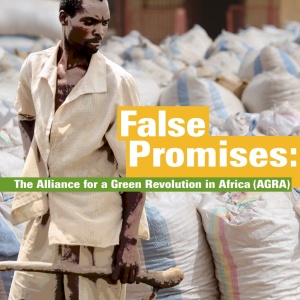
This report, published by a group of African and German nonprofits, critically assesses the work of the Alliance for a Green Revolution in Africa (AGRA). AGRA was founded by the Bill and Melinda Gates Foundation and the Rockefeller Foundation, and has received nearly $1 billion in funding.
According to the report, AGRA promotes agricultural technologies such as high-yield commercial seeds, synthetic fertilisers, and pesticides. AGRA initially aimed to “double yields and incomes for 30 million farming households by 2020”, but deleted that goal from its website in June 2020 without explanation. The report argues that AGRA has failed to be transparent, noting that AGRA has not published an evaluation of the effectiveness of its programmes.
The report finds that there has been little progress on productivity, income, or food security in AGRA’s 13 target countries. Specifically:
- There has been a 30% increase in the number of hungry people in AGRA’s target countries.
- The average annual increase in crops yields in these countries has been 1.5%, similar to the growth rate seen before AGRA began its operations.
- Where production of staple foods has increased, poverty and hunger have remained high and small-scale farmers did not benefit strongly.
- The Green Revolution model has driven production away from climate-resilient traditional crops such as millet and sorghum and towards maize. Farmers now have to pay for seeds, in contrast to traditional crops where farmers could obtain seeds cheaply through exchange with other farmers.
- Some production increases have come from expansion of agricultural land, and there is evidence of associated negative environmental effects, such as acidification of soils under monoculture production.
- Small-scale farmers are sometimes denied control over what they produce, e.g. in a Tanzanian project, farmers could only join AGRA projects if they refrained from mixed cropping, and farmers in a Rwandan project were fined if they did not plant approved crops.
Read the full report, False Promises: The Alliance for a Green Revolution in Africa (AGRA), here (PDF link). See also the Foodsource Building Block What is sustainable intensification?







Post a new comment »